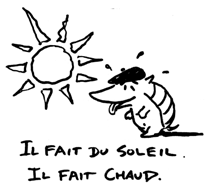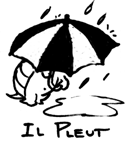2.4 La Météo
Quel temps fait-il?
The verb faire is used in many weather expressions, expressions that are impersonal.

| Quel temps fait-il? What’s the weather like? |
| Il fait beau. It’s beautiful. |
| Il fait chaud. It’s hot. |
| Il fait du brouillard. It’s foggy. |
| Il fait du soleil. It’s sunny. |
| Il fait du vent. It’s windy. |
| Il fait frais. It’s cool. |
| Il fait froid. It’s cold. |
| Il fait mauvais. It’s bad. |
Ecoutez et répétez
Other weather expressions which do not use faire include:
Quel temps fait-il aujourd’hui?

| Il pleut. It’s raining. |
| Il neige. It’s snowing. |
| Il y a du soleil. There’s a lot of sun. |
| Il y a du vent. It’s windy. |
Pratiquons!
Quizlet – pratiquons encore!
Exercice
Cliquez le lien et consultez la météo aujourd’hui en France. Puis répondez aux questions.
- Quel temps fait- il à Paris aujourd'hui? Il fait du soleil? Il y a des nuages? Il pleut? Il neige?
- Et à Nice? Quel temps fait-il? Quel est la temperature?
- Et à Bordeaux?
- Et à Strasbourg?
Exercise
Regardez la vidéo et écoutez les trois bulletins météo. Puis, répondez aux questions.
Encore! Les chanteurs nous parle
Refrain: Stromae
Toujours autant d’pluie chez moi, Toujours autant d’pluie chez moi
Mais il fait quand même beau, il fait beau, il fait beau, il fait beau
Chez moi, il fait beau, il fait beau, il fait beau, il fait beau
Chez moi, il fait beau.
Le verbe = l’action
Verbs are action words that express the action (He runs) or state of being (I am tired) of a sentence.
French verbs have to be “conjugated” that is, changed according to how they are used.
The basic form of a verb is called the infinitive The English infinitive is “to” followed by a verb, while the French infinitive is a single word with one of three infinitive endings (-er, –ir, or –re). These can then be further divided into regular verbs, which follow a standard pattern of verb conjugations, and irregular verbs, which don’t:
| 1. –er parler (to speak)
2. –ir finir (to finish) 3. –re vendre (to sell) |
Can you classify these verbs?
Most French verbs are conjugated by removing the infinitive ending to find the “radical” or “root” (e.g., parler –> parl-) and then adding the appropriate ending. More on verbs soon.
Révisons!
Recap – You should be able to answer these questions. Listen and answer on your own. Then record and listen to yourself.
- Chez vous, quel temps fait-il aujourd’hui?
- Quelle heure est-il?
- Quelle est la date aujourd’hui?
- C’est quelle saison?
- Quelle est la date de votre anniversaire?
today

